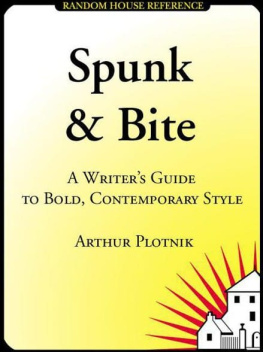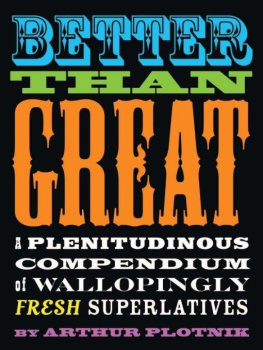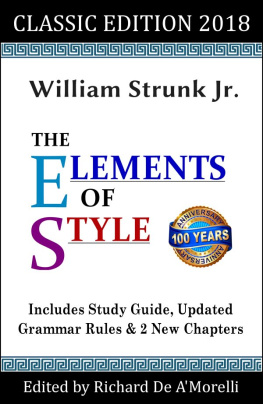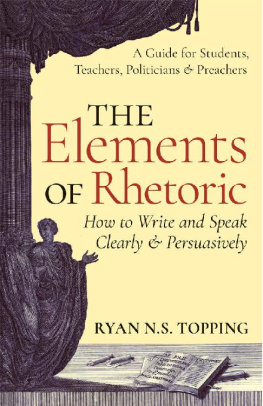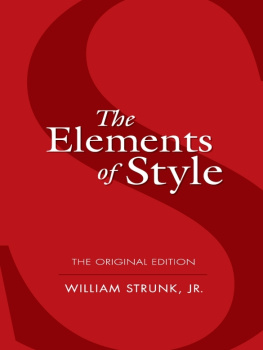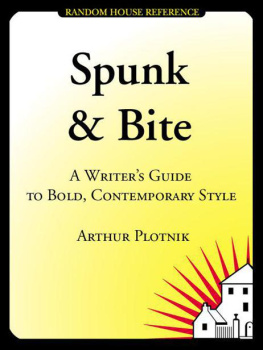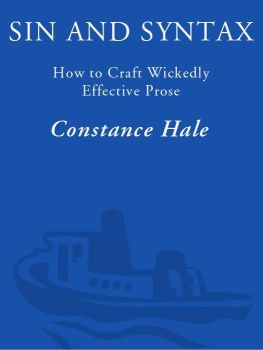
SPUNK
& BITE
CONTENTS
COVER PAGE
PERMISSIONS/ACKNOWLEDGMENTS
With gratitude I acknowledge the kind permission of Elena Karina Byrne for use of lines from her poem, Sex Mask, as it appeared in Chelsea 76; and of Christina A. Thompson ( Harvard Review ), John Tait ( American Literary Review ), and Ronald Spatz ( Alaska Review ) for remarks they provided for an earlier article of mine.
For other helpful kindnesses, I thank Elfrieda M. Abbe and Jeff Reich of The Writer magazine; the reference staff of the Chicago Public Library; friends and former colleagues at the American Library Association; Sean Morris, Ilene Cooper, Rudy Joenk, and William Meehan; agent Ed Knappman and editor Jena Pincott; support team Plotnik/Taub; and my constant advisor and soul mate, Mary Phelan.
Portions of some chapters appeared, in earlier versions, in The Writer magazine and The Editorial Eye newsletter. A.P.
INTRODUCTION
Sometimes when Im digging for the right word, I long for a terrier-like acuity, a canines sensory gifts applied to language. Imagine if dogs ever figured out how to put that spunkiness and bite of theirs into action verbs, or to root around for bons mots with those lubricated snoots. We dry-and-fleshy-nosed writers could be in big trouble.
Some of us are there anyway. With so many gifted authors already sniffing their way to publication, with readers drawn to ever-new distractions, who can afford a writing-as-usual attitude? Not creative writers, not journalists, copywriters, or corporate communicators. Nor can writing students gear up in all the old ways. Even bloggers, even Match.com troubadors, must realize that in todays forest an undistinguished post falls soundlessly.
One might wish to live by ones words, but language or style that is less engaging, less stimulating than the competition, is, frankly, dead on arrival. Imagine legions of writers setting off on the marathon run to success. Among them are thousands who have mastered the basic skills of composition. Should you need to catch up, scores of worthy grammar/style books are standing by to help. But if your goal is to break away from the pack, some ber force, some jack-rabbit anima has to inhabit your writing.
Enter this book. Looking at all types of contemporary writing, Spunk & Bite distills the elements that make for punch and vivacity; it demonstrates enlivening techniques, including those spurned by conventional guides; and it illustrates its advice with sparkling examples from our best writers. Although occasionally tweaking correctness to the times, Spunk & Bite is not another Strunk & Whiteas the iconic writers rule book Elements of Style is known; instead, it addresses those whose composition skills compare with the next writers, but who itch for creative ideas, smart locutions, and realistic takes on language for todays media.
Not that I claim a hounds quickness in seizing the prize; but I do have one special gift, perhaps the odd fruit of a life as editor, author, and reader: I see dead writing.
I see language that follows the rules but lacks the vigor and inventiveness ever to rise off the page. It talks to me; weeps over lessons learned too late. I feel its anguish, and sometimes as an editor Ive applied a stitch here, a jolt there, so that it might stagger among the undead. But the only authentic way to enliven a piece of writing, give it corporeal clout, is to invigorate it at the outset. To this end, Spunk & Bite fosters some unorthodox approaches; it is not, however, about out-shrieking the next writer or trashing the language authorities. Its observations and advice (to be read in order or, after , randomly) are meant to energize writing and liberate it from certain outdated style conventions.
Of course, throwing off restraints is one thing; using newfound freedom is another. Will it be to create self-indulgent drivel, or adventurous art that engages editors and readers? If you aspire to the latter, if you write to get published and heardor if you simply enjoy the pursuit of vivid languagethen this spunky dog will hunt, I tell you, or Im a French poodle.
A.P., Chicago
Flexibility
A LITTLE LIGHT UNSTRUNKTION
ONE
E. B. WHITEWASHED:
A STARTING POINT
Place yourself in the background. Do not affect a breezy manner. Do not inject opinion. Use figures of speech sparingly. Avoid foreign languages. Prefer the standard to the offbeat.
What have we herea gulag for deviant writers? Whenever I review those dictates from The Elements of Style, that cynosure of American composition by William Strunk Jr. and E. B. White, I feel I should make a dash for it, vault the gates into the free zone.
In the course of a long writing career, I have often been on the lam from Composition 101 and its constables, Strunk and White. After all, I want my opinion heard. I want to be offbeat. What writer doesnt? I want to be so offbeat that crazed readers chase me down alleys. And yet I keep staggering back to The Elements of Style to review those sensible rules I want to savageor embrace in my next piece.
Schizoid? Not given the yin-and-yangness of todays readership: half focused, half distracted; half in the armchair savoring the well-chosen word, half seeking thrills in the electronic wilds. Somehow the writer must flag attention in a swirl of divergent moods, trends, and affinities. If the idea of writing is indeed to be published and read, then writers want flexibility. They want both sheriff and outlaw roaming those right brains to rein in the yang or conspire with the yin. Of course, in brains attuned to the The Elements of Style, the sheriff is already on the sceneand he is one puissant little cuss. Just about every writer of American prose feels Strunk and Whites tug. How astonishing that this diminutive book has maintained such a hold on our writing. How did this happen? How is it justified? Which of Strunk and Whites teachings should writers respect? And which should they rebel against?
As an author of writing advice, Ive tried repeatedly to answer such questions to my own satisfaction. And whenever I think Ive done so, new waves of adulation for Elements of Style dampen my convictions. But one thing stays with me: Each time I return to Strunk and Whites otherwise purehearted classic, I discover what I can only describe as a certain troublesome whitewash in their approach. And though Im not the only one to have discovered it, Im the only one whos going to tell you about it here and now, for your own good!
RULES VS USAGE: THE WARRING SIDES
Pound for pound, no American writing guide is more revered than the five-ounce Elements of Style, aka Strunk and White. No reference book sells more copies or draws gushier superlatives ( Timeless!; Nonpareil!; The best book of its kind! ). With some ten million copies rooted on as many reference shelves, Strunk and White has become the ivy (if not the kudzu) on our great walls of clarity and correctness.
Yet for all its glory, the book can be a magnet for bashers. For one thing, it is geriatric: First published in 1918, it underwent its fourth resuscitation in 2000. It is also small and vulnerableas pokable as the Pillsbury doughboy for determined critics. Its two authors are thoroughly dead, white, and male. And the coddling it enjoys, together with the rules it imposes, makes rebel blood boilas if Strunk and White were the imperial force in that battle for the language galaxy, the War of Rules versus Usage.
The War began in the late 1950s, pitting liberal language authorities against conservative ones. Taking a stand against elitist notions of correctness, the liberals argued that language derives its validity from actual use, and not from a bunch of prescribed forms. This so-called descriptive approach to standard English was viewed as toxic by the prescriptivists, who not only believed in established rules of expression, but supported a continuum of worthiness ranging from illiterate and vernacular to formal.
Next page
